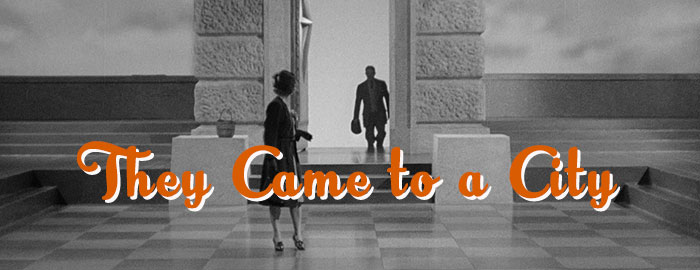

B&W, 1944, 77 mins. 57 secs.
Directed by Basil Dearden
Starring John Clements, Googie Withers, Raymond Huntley, Renee Gadd, Ada Reeve, A.E. Matthews, Norman Shelley, Mable Terry Lewis, Frances Rowe
BFI (Blu-ray & DVD) (UK RB/R2 HD)
 known today as the author of the
known today as the author of the 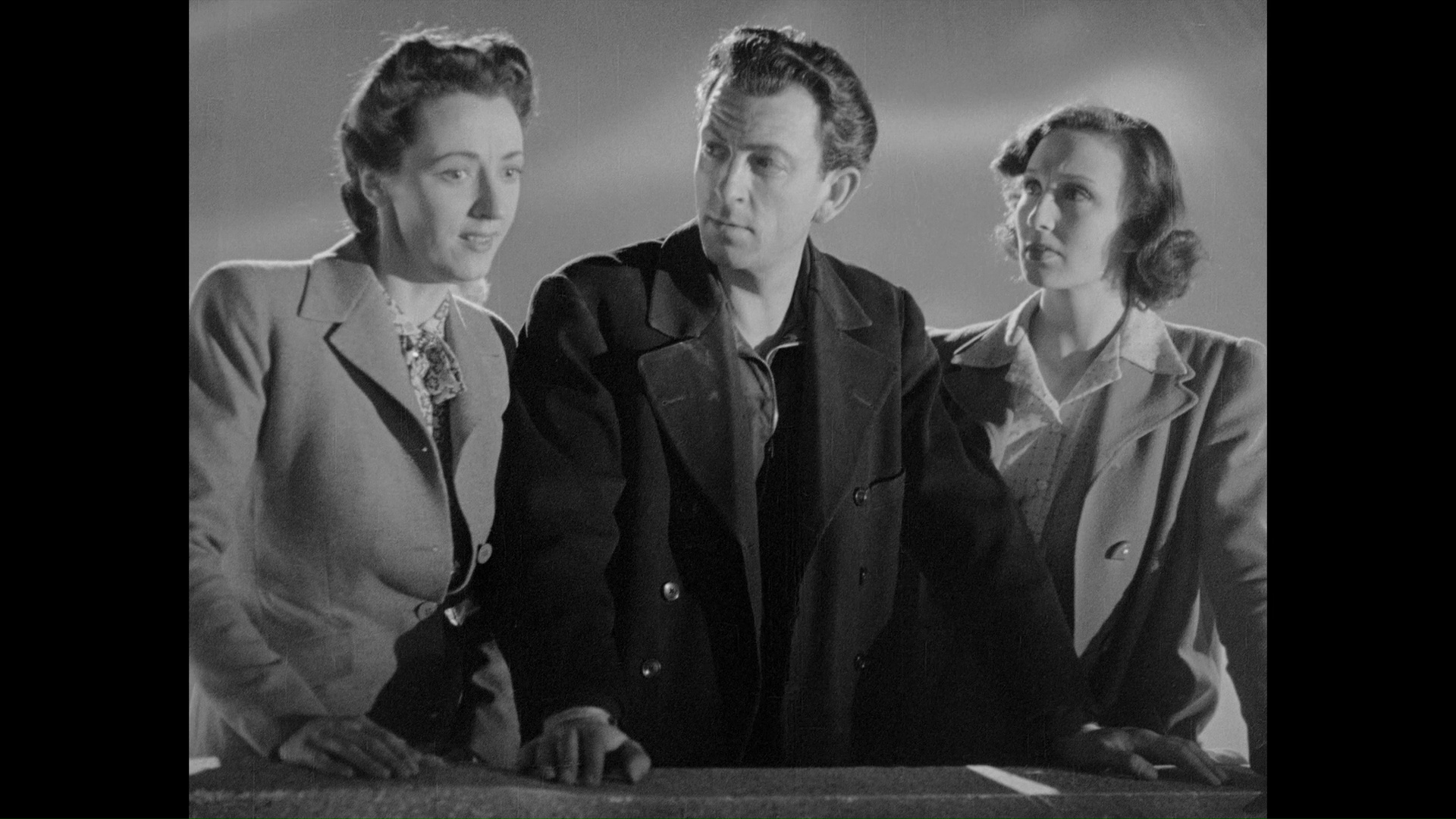 allegorical hit play An Inspector Calls and the source novel for what would become the horror classic The Old Dark House, J.B. Priestley is one of the more fascinating authorial voices in the aftermath of World War I England. A left-leaning military veteran from Yorkshire, he had a penchant for writing novels and plays based around lofty concepts that sometimes ended up being muddled in translation to other media. However, that certainly wasn't the case with They Came to a City, a faithful transposing of his 1943 fantasy play about the need to see a better world ahead at the height of the turmoil of World War II. Sort of an amalgamation of chestnuts like Lost Horizon and No Exit, the Ealing Studios production was a logical choice for one of its best directors, Basil Dearden, who had just helmed the excellent supernatural wartime fantasy The Halfway House and the framing material for the classic Dead of Night. Here he finds a strong visual sensibility heavily inspired by the popular surrealist movement to mount the tale of a group of different social classes and philosophies confronting the prospect of utopia.
allegorical hit play An Inspector Calls and the source novel for what would become the horror classic The Old Dark House, J.B. Priestley is one of the more fascinating authorial voices in the aftermath of World War I England. A left-leaning military veteran from Yorkshire, he had a penchant for writing novels and plays based around lofty concepts that sometimes ended up being muddled in translation to other media. However, that certainly wasn't the case with They Came to a City, a faithful transposing of his 1943 fantasy play about the need to see a better world ahead at the height of the turmoil of World War II. Sort of an amalgamation of chestnuts like Lost Horizon and No Exit, the Ealing Studios production was a logical choice for one of its best directors, Basil Dearden, who had just helmed the excellent supernatural wartime fantasy The Halfway House and the framing material for the classic Dead of Night. Here he finds a strong visual sensibility heavily inspired by the popular surrealist movement to mount the tale of a group of different social classes and philosophies confronting the prospect of utopia. 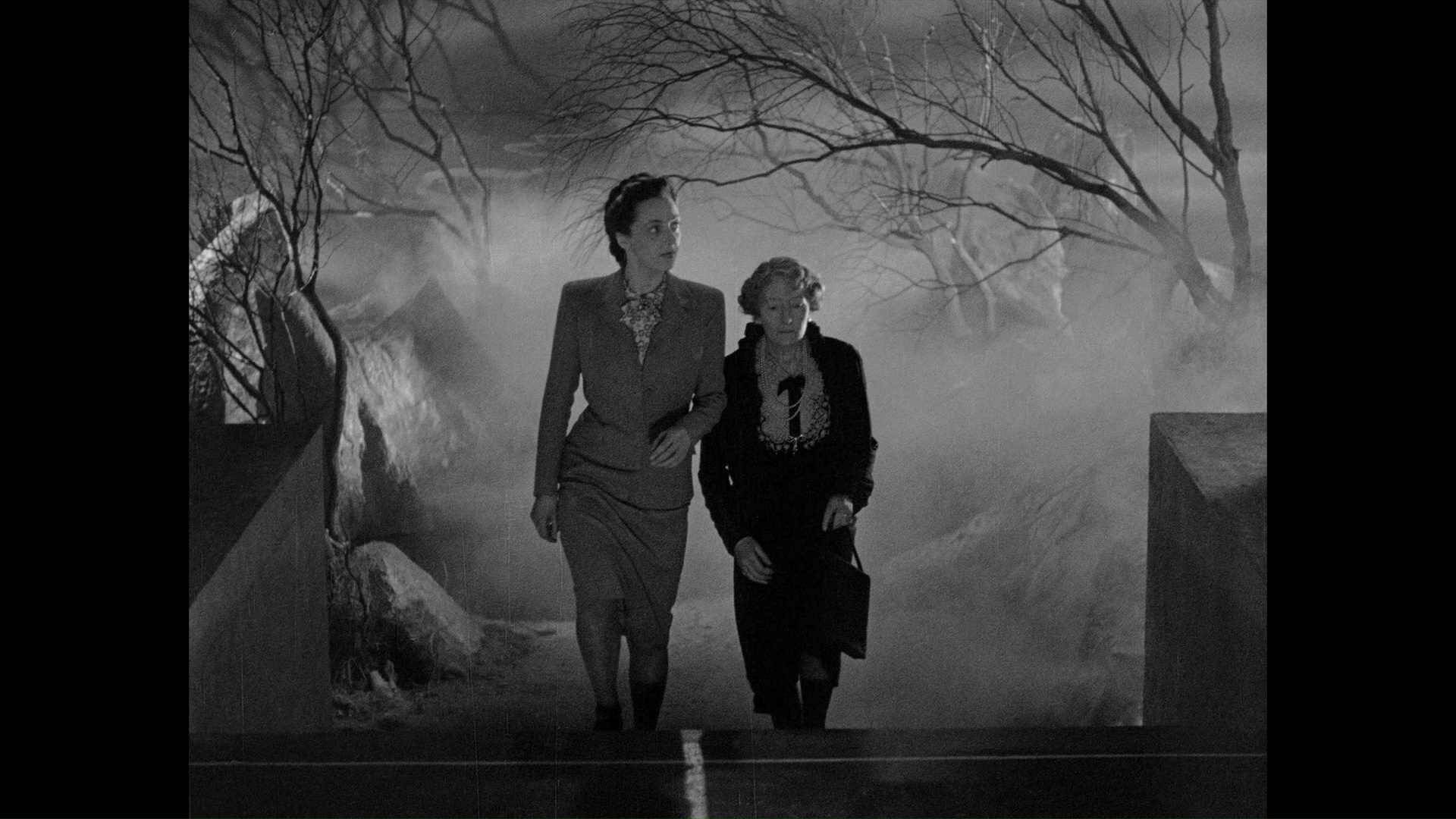 into a repetition of how it's always been before? Their conversation is interrupted by the pipe-puffing Priestley himself, who settles down to present them with a unique scenario in
into a repetition of how it's always been before? Their conversation is interrupted by the pipe-puffing Priestley himself, who settles down to present them with a unique scenario in  which nine people end up wandering out of their normal environments into darkness -- only to then find themselves on the outskirts of a perfect city. After a waiting period outside, they are each allowed into the city (which remains unseen to the audience), only to have some unexpected reactions that find many of them deciding to go back. Among them are barmaid Alice (luminous Ealing regular Withers), the first to be transported, and activist sailor Joe (Clements), who strike up a tentative romance but have different views of how to deal with their circumstances. Other new arrivals range from a washerwoman (Reeve), who's given the best years of her life to serving others, to banker Malcolm (Huntley) and his wife (Gadd) who also have different takes on the limitations of their old lives.
which nine people end up wandering out of their normal environments into darkness -- only to then find themselves on the outskirts of a perfect city. After a waiting period outside, they are each allowed into the city (which remains unseen to the audience), only to have some unexpected reactions that find many of them deciding to go back. Among them are barmaid Alice (luminous Ealing regular Withers), the first to be transported, and activist sailor Joe (Clements), who strike up a tentative romance but have different views of how to deal with their circumstances. Other new arrivals range from a washerwoman (Reeve), who's given the best years of her life to serving others, to banker Malcolm (Huntley) and his wife (Gadd) who also have different takes on the limitations of their old lives.  of Priestley's treatise, even when the finale essentially consists of two characters gazing off screen and delivering optimistic dialogue about the tough choice they've just made.
of Priestley's treatise, even when the finale essentially consists of two characters gazing off screen and delivering optimistic dialogue about the tough choice they've just made. 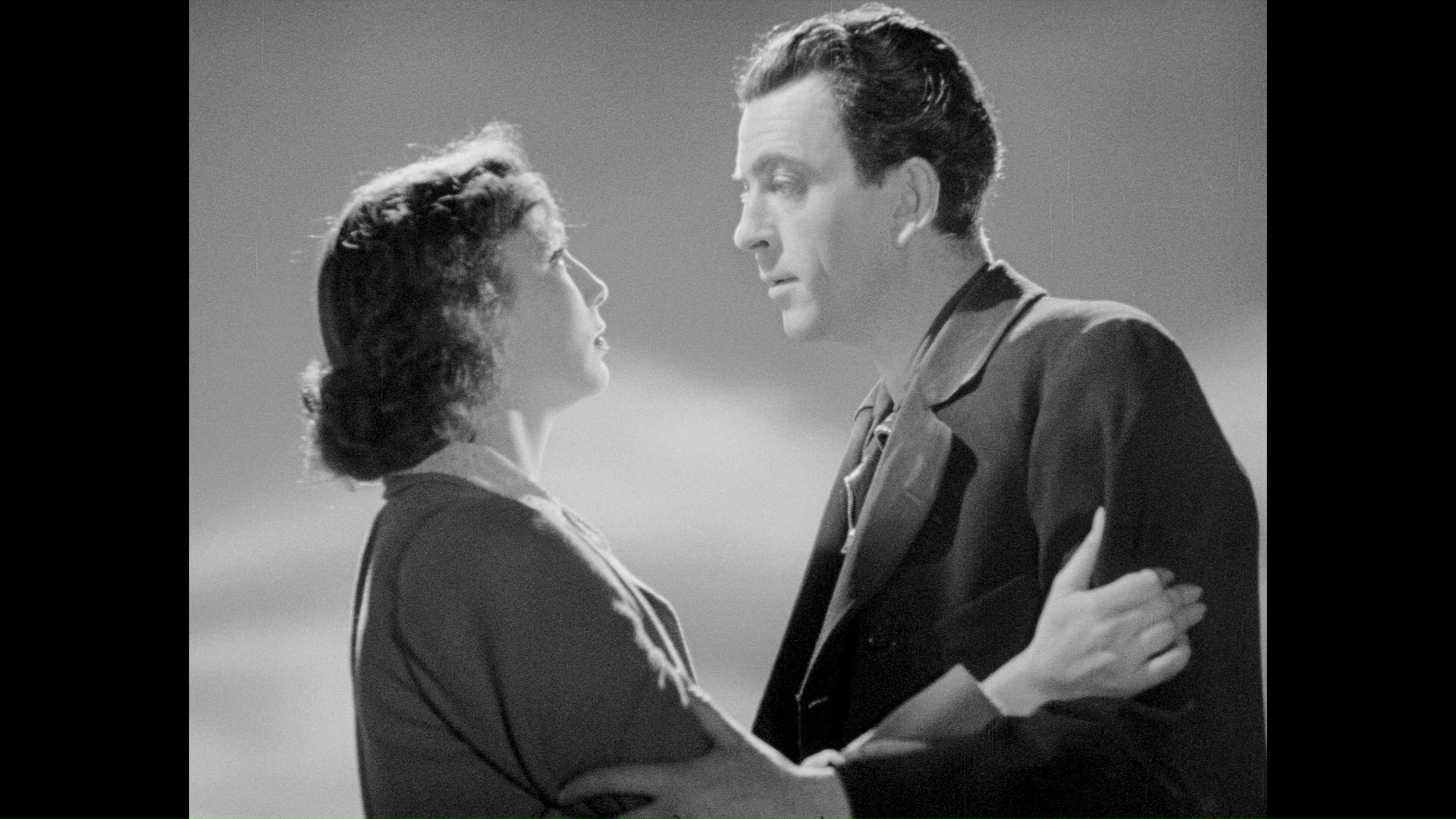 It doesn't hurt that much of the dramatic weight falls on Withers and Clements, both excellent and able to infuse their characters with more charisma and humanity than what the written roles require.
It doesn't hurt that much of the dramatic weight falls on Withers and Clements, both excellent and able to infuse their characters with more charisma and humanity than what the written roles require.  with other topics including the challenge of all-British films breaking through in America and the popularity of American-involved propaganda Islington films during the war. Priestley pops up for "We Live in Two Worlds" (13m52s), directed by Ealing's
with other topics including the challenge of all-British films breaking through in America and the popularity of American-involved propaganda Islington films during the war. Priestley pops up for "We Live in Two Worlds" (13m52s), directed by Ealing's 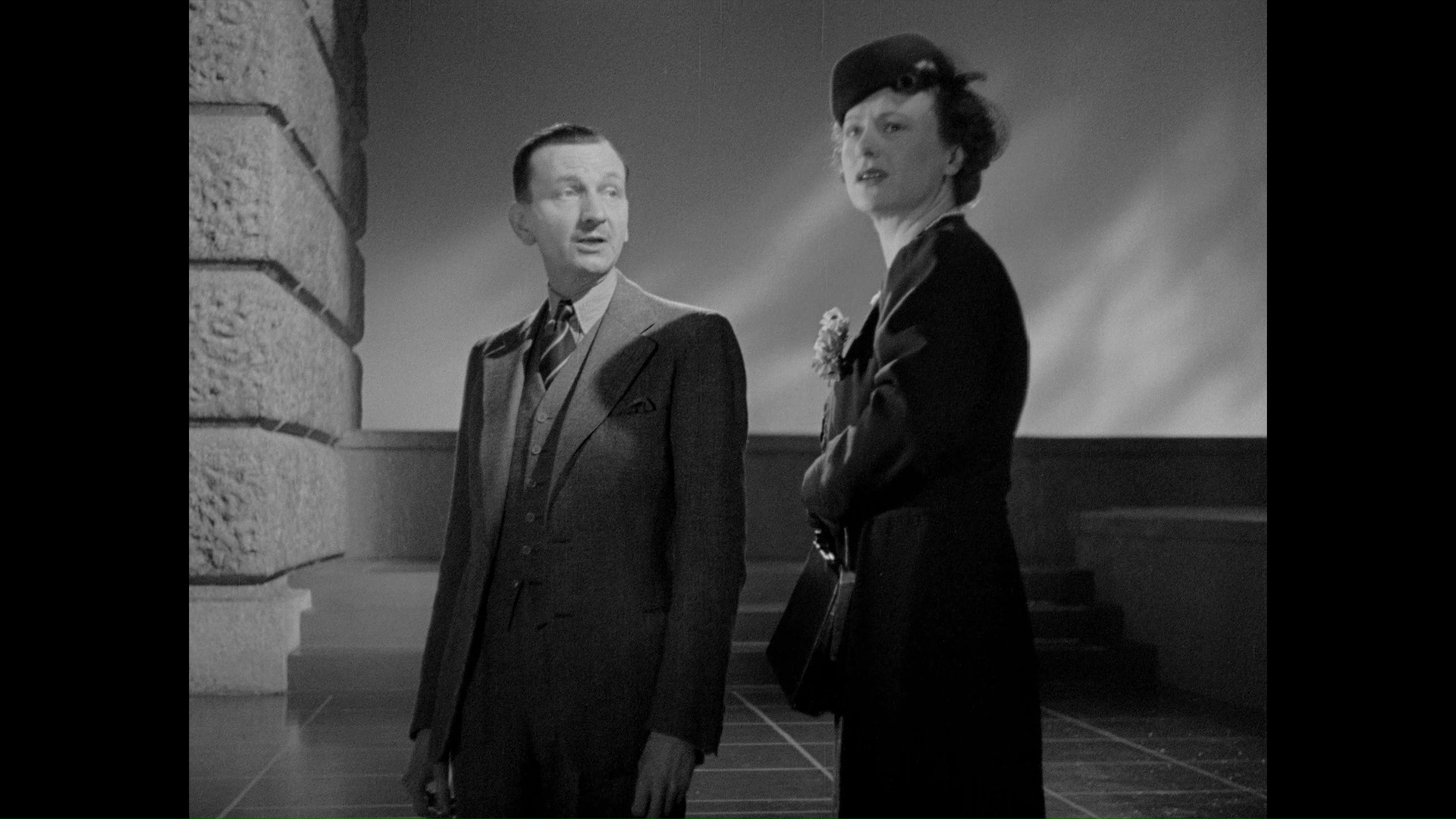 Alberto Cavalcanti, in which he expounds about the different mindsets of nationalism versus universal trade and communication, with Switzerland serving as a fascinating example of how to exist between the two. In "Britain at Bay" (7m6s), Priestley examines the rise of Nazism as a threat to Europe with his own country standing steady against the menace. "A City Reborn" (22m22s), penned by none other than Dylan Thomas, is essentially a pitch film for prefabricated houses as a solution to rebuilding after the WWII blitz using Coventry as an example to create a "good, decent place to live in" compared to the slums that existed before. The sole color entries on the disc, 1948's "Charley in New Town" and "Your Very Good Health" from animation company Halas & Batchelor, feature hand-drawn depictions of the benefits of post-war reconstruction in towns offering new employment opportunities and amenities ("Flower gardens! A posh theater!") and the need for the newly-formed National Health Service, even for those who wanted nothing to do with it at the time. The liner notes booklet features a batch of essays about Priestley and the film from contributors including Dr. Dr Josephine Botting, Tim O'Sullivan, Katy McGahan, Jenny Stewart and Alan Burton, plus notes on the extras and excerpts showing how this film's chilly critical reception upon its initial release may have had something to do with its unfortunate time in the wilderness ever since.
Alberto Cavalcanti, in which he expounds about the different mindsets of nationalism versus universal trade and communication, with Switzerland serving as a fascinating example of how to exist between the two. In "Britain at Bay" (7m6s), Priestley examines the rise of Nazism as a threat to Europe with his own country standing steady against the menace. "A City Reborn" (22m22s), penned by none other than Dylan Thomas, is essentially a pitch film for prefabricated houses as a solution to rebuilding after the WWII blitz using Coventry as an example to create a "good, decent place to live in" compared to the slums that existed before. The sole color entries on the disc, 1948's "Charley in New Town" and "Your Very Good Health" from animation company Halas & Batchelor, feature hand-drawn depictions of the benefits of post-war reconstruction in towns offering new employment opportunities and amenities ("Flower gardens! A posh theater!") and the need for the newly-formed National Health Service, even for those who wanted nothing to do with it at the time. The liner notes booklet features a batch of essays about Priestley and the film from contributors including Dr. Dr Josephine Botting, Tim O'Sullivan, Katy McGahan, Jenny Stewart and Alan Burton, plus notes on the extras and excerpts showing how this film's chilly critical reception upon its initial release may have had something to do with its unfortunate time in the wilderness ever since. ![]()